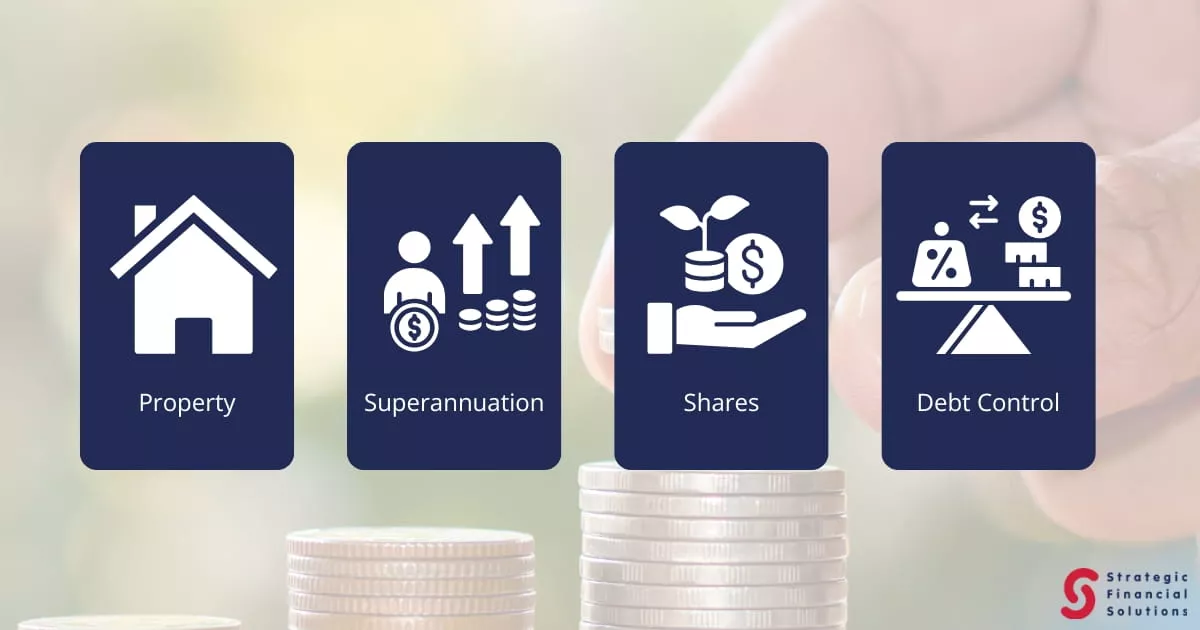Why You Need a Financial Plan: The Benefits of Proper Financial Planning


According to the Australian Bureau of Statistics‘ 2021 Census, the median weekly household income in Greater Melbourne was $1,901.
This sets a realistic baseline for what many households can save or invest.
Housing costs, at the same time, place steady pressure on household finances.
The current ratio of Melbourne’s dwelling value to income sits at 6.9. This is lower than the 2017 peak (8.2), but it remains high by historical standards.
Source: Is Melbourne’s housing market a ‘basket case’ or ‘beacon of hope’ for Australia?
These two figures explain much about how wealth is built locally. Income growth has been steady instead of rapid. Asset prices, especially property, have risen faster than wages for more extended periods.
Structure. Time. Consistency. As a result, these have shaped successful wealth-building in Melbourne.
People who built wealth over the past two decades often used familiar, repeatable strategies, focusing on property, superannuation, shares, and careful debt control.
The following sections outline 10 common strategies, supported by local data and real-world examples, that Melburnians have used.

Strategy #1: Investing in Property in a High-Growth Melbourne Suburb
One example is Preston, which is about 9 kilometres north of the CBD. It is cradled in Melbourne’s inner to middle ring, where, over time, demand has been consistent.
Public data shows that house prices in Preston have risen over the past five years. Suburb profiles published by Domain show positive price movement across this period. The same source places Preston’s median house price above Melbourne’s long-term average.
This pattern aligns with broader city trends. Over the five years to 2024, Melbourne dwelling values increased despite short downturns.
Source: Cotality Home Value Index, Melbourne, accessed 2026
Short-term gains are not what matter. Most owners who built wealth held property through complete market cycles. What did they benefit from? Price growth, loan repayment, and time.
There are risks.
Prices fell in parts of Melbourne between 2017 and 2019.
Rising interest rates also increased holding costs after 2022.
These factors slowed growth but did not erase long-term gains.
This strategy worked best for buyers who planned to hold for many years. It relied on patience, a stable income, and the ability to manage debt over time.
Strategy #2: Maximising Superannuation with Voluntary Contributions

For example, Melbourne professionals who make voluntary super contributions during peak earning years (typically ages 40-55) tend to accumulate higher balances by retirement.
The median super balance for people aged 55-64 is approximately $207,600, whilst for people aged 25-34 is roughly $42,000.
Super balances rise sharply and surely with age, reflecting compounding over time. Data published by the Australian Bureau of Statistics show that the highest balances are held by Australians close to retirement (aged 65-74), rather than younger adults (under 35), who have lower average balances.
Source: Australian Bureau of Statistics, Household Income and Wealth, Australia, latest release
The Australian Taxation Office affirms that you can grow your super through your employer’s contributions, voluntary contributions, and available government contributions. Caps apply to the amounts that can be contributed to your super each financial year. (Going over these caps may mean paying extra tax.)
Long-term savers give this strategy a thumbs-up.
Strategy #3: Investing in ASX Index Funds or Blue-Chip Stocks
A common approach has been long-term ownership of dividend-paying Australian blue-chip stocks, such as major banks and mining companies.
Australian shares have delivered average annual returns of around 9-10%, including dividends, over long periods, reflecting decades of market data rather than short cycles.
Source: Morningstar Australia, 30-year Australian share market returns, accessed 2026
Dividend yields among the 200 most extensive ASX-listed stocks have ranged from about 0% to 21.5%, according to recent historical data. This highlights how income levels can differ across companies and market cycles.
Source: ASX, Power of dividends, accessed 2025
As with other strategies, this is not without risks:
- Share prices can fall sharply in short periods.
- High dividend yields can also signal stress in a business.
Investors who benefited most held diversified portfolios and stayed invested across market cycles. Most importantly, they avoided short-term decisions.
Strategy #4: Using Mortgage Offset Accounts and Debt-Reduction Strategies
Many Australian households use this strategy to build equity faster. It is common among owner-occupiers in high-priced cities like Melbourne. Here, specifically, returns come from avoided interest, not income.
This approach is commonly used by owner-occupiers in Melbourne’s middle-ring suburbs, where larger mortgages make interest savings more material over time.
For example, if a loan is $600,000 and the offset holds $40,000, interest applies to $560,000. The funds remain accessible and can be used at any time.
This strategy works best for households with stable income, long-term homeowners, and people who value certainty over volatility. Because Australian mortgages are long-term, small changes in interest costs have a material effect over decades.
MoneySmart guidance explains that offset accounts reduce interest, not the loan balance. Lower interest means more of each repayment goes toward the principal.
Strategy #5: Strategic Budgeting and Automated Savings
Strategic budgeting involves aligning financial plans and decisions with long-term goals for businesses and individuals. MoneySmart offers easy steps to plan and manage your spending. (See: How to do a budget)
During Melbourne’s 2020-2021 lockdown, many households increased their savings by automating transfers before discretionary spending.
ABS household data show that saving behaviour changes with economic conditions. Savings rose sharply during 2020 and 2021, then eased as costs increased. This confirms that savings are influenced by structure, not intent alone.
Strategy #6: Using Franking Credits, Negative Gearing, and Tax-Aware Investing
Beyond chasing returns, many Australians build wealth by managing their tax. Two standard tools are franking credits and negative gearing.
| Franking Credits | Negative Gearing |
|
|
Source: Australian Taxation Office, Rental Income and Deductions, 2022-23
It is important to note that these strategies depend on tax rules. Policy changes can reduce their value. In other words, they work best when used with long-term planning.
Strategy #7: Creating Side Businesses or Additional Income Streams
Examples include Melbourne-based sole traders in professional services, consulting, and personal services who use extra income to reduce debt or build savings.
Extra income is often used to build savings or pay off debt. Over time, this also supports asset growth. Reflecting a broader shift toward flexible income sources, ABS data show a steady increase in the number of sole traders over the past decade.
Source: Australian Bureau of Statistics, Business Counts, Australia
Important notes: Side income is not guaranteed. Earnings can vary. Not all ventures succeed.
Strategy #8: Investing in Education and Upskilling
This is common among Melbourne workers who complete university degrees or postgraduate qualifications that lead to professional and specialist roles.
Of people aged 15-74 in 2025, 12.3 million (61%) were fully engaged in work, study, or both.
Further, according to ABS, degree holders earn significantly higher median incomes than those without qualifications (In August 2025, median weekly earnings were highest amongst employees with a postgraduate degree ($2,000 per week), and were lowest for those without non-school qualifications ($1,000)).
It is worth noting, though, that education has costs and risks. Returns depend on the field and demand, so outcomes are not guaranteed.
Strategy #9: Using Dividends and Reinvestment Strategies
Reinvesting dividends increases share ownership over time. This supports compounding during both rising and flat markets.
A typical example is long-term ownership of Australian bank shares, where dividends are reinvested to grow shareholdings over time.
Dividends have historically contributed around half of total long-term returns for Australian shares, including periods of weak price growth. (Source: ASX, Power of Dividends)
Also, ABS data show that shares and managed funds account for a significant share of household wealth. Meaning, dividend income is a common source of investment earnings.
There are limitations:
- Dividend amounts can change or be cut.
- High yields may signal risk rather than strength.
This strategy has worked for patient investors. It rewards consistency, reinvestment, and long-term holding.
Strategy #10: Seeking Guidance from a Financial Adviser
The key value: structure. Advice encourages regular contributions and long-term discipline.
For example, Melbourne households that engage an adviser to align super, debt, and investments often maintain consistent contributions across market cycles.
Research cited by the Australian Securities and Investments Commission shows that advised Australians tend to accumulate significantly higher retirement balances than those without advice. This difference reflects consistent saving and staying invested through market cycles.
Industry analysis cited in ASIC reports indicates that people who receive ongoing advice can retire with approximately double the superannuation balance of those who do not. This finding has been observed across long-term studies.
Points to consider: Advice is not a guarantee. Costs apply, and quality varies. Results depend on long-term engagement, not short-term decisions.
What the Data Shows About Building Wealth in Melbourne

Wealth in Melbourne has rarely come from a single decision or a single good year. It has been built through steady, long-term decisions.
The data shows common patterns. People focused on property, super, shares, and debt control. They saved consistently and monitored taxes and costs.
No single strategy worked on its own. Progress came from combining approaches and staying disciplined. Time played a bigger role than timing.
These strategies are not quick fixes. They reflect how Melburnians have responded to rising costs and limited income growth. The outcomes came from patience and informed decisions.
If you are planning your next steps, consider which of these strategies fits your situation: clear goals and structure matter.
Want tailored advice based on your financial goals? Speak to a local financial planner in Melbourne who understands the market.
